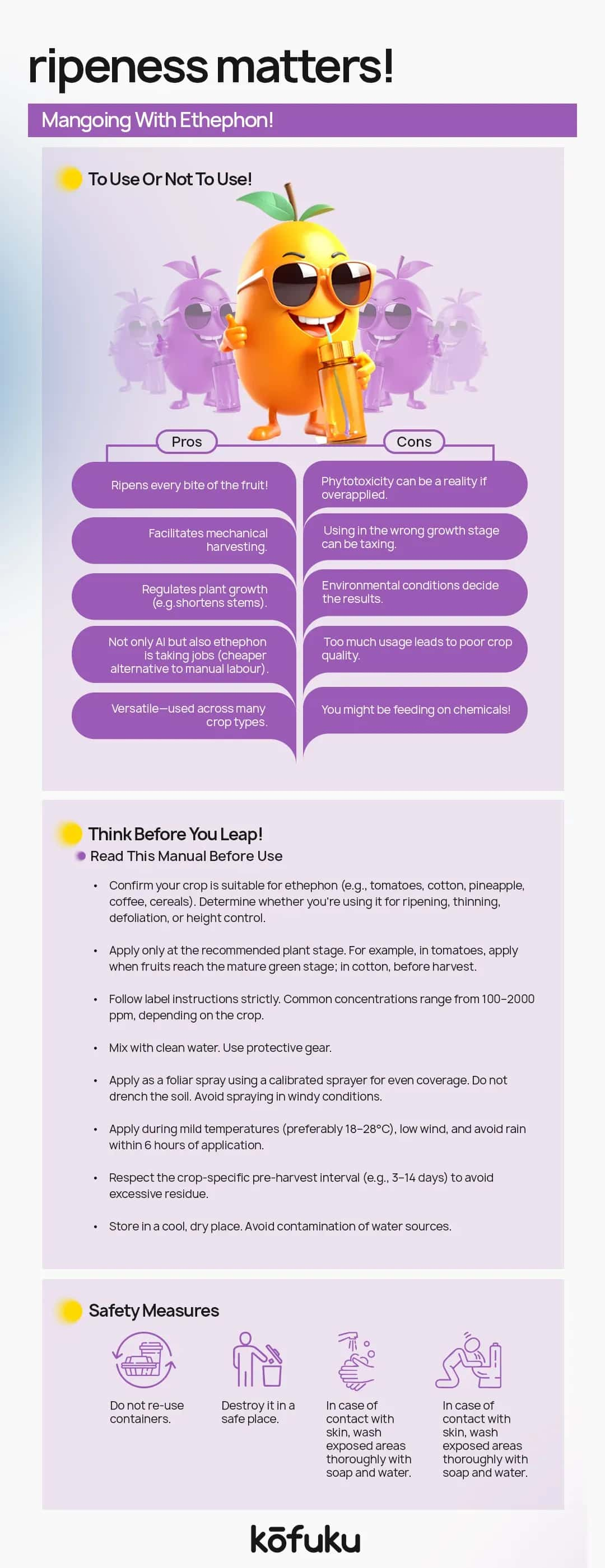Ethephon Crisis in Mangos: Is It Safe to Have Mangoes?


Introduction
Ah, mangoes. India’s golden gift to the world. The undisputed king of fruits. The only thing that can make an Indian summer bearable, especially in this current heatwave.
You think of mangoes, and suddenly, life feels like a Bollywood dream sequence: you’re running through an orchard, arms wide open, and Alphonsos and Dussheris are gently falling into your basket.
But wait! What if I told you that this very mango, this symbol of childhood nostalgia and sticky fingers, could be poisonous?
Yep, that mango you just bit into might have been ripened using ethephon, a chemical that has sparked more debates than pineapple on pizza.
From Calcium Carbide to Ethephon - A Chemical Love Story
Let’s rewind a bit. Once upon a time, mango vendors used calcium carbide to force mangoes to ripen faster. The problem? It’s basically a fruit’s equivalent of speed dating - unnatural, forced, and often leading to disaster.
Also, calcium carbide contains traces of arsenic and phosphorus. To make it easier, you were munching on mangoes with a side of mild toxicity.
So, to fix this, authorities banned calcium carbide and introduced a “safer alternative,” i.e., Ethephon. This chemical is like your overactive friend who pushes you to achieve your goals at any cost, maybe in a few days, at the right temperature.
It releases ethylene, a natural ripening hormone in fruits, which causes mangoes to turn yellow and soft in a few days.
Sounds great, right? Well, not so fast.
How Ethephon Works Its Magic or Mischief on Mangoes
Ethephon is absorbed by the fruit’s skin and then breaks down into ethylene gas. Ethylene, in turn, tells the fruit, “Wake up, buddy. It’s time to shine (ripening time)!”
You can notice the green fades turn into yellow completely, and suddenly, you’ve got a mango that looks perfectly ripe.
But here’s the catch: if too much ethephon is used, it doesn’t completely break down and can leave toxic residues. And guess where those residues end up? Right in your digestive system, potentially causing nausea, irritation, or worse.
Can We Eat the Ethephon Mangoes?
Yes, but with caution.
If mangoes are ripened using small, regulated amounts of ethephon, they’re generally safe to consume. The problem is that not all vendors follow the instructions for the right amount to be used. At least 0.5 grams is said to be enough for 10 kg of mangoes.
But surprise… surprise. Some use excessive amounts to rush the ripening process, leading to those uncomfortable bright yellow mangoes that taste a little… off.
Some common side effects to watch out for -
-
Vomiting
-
Diarrhoea
-
Weakness
-
Burning sensation in the chest and abdomen
-
Burning of the eyes
Severe symptoms -
-
Throat sores
-
Shortness of breath
-
upset stomach
-
peptic ulcers after being exposed to the chemical for a longer duration
-
Affects the neurological system (headache, high sleepiness, memory loss, numbness in the legs and hands, low blood pressure and seizure).
Research indicates that mangoes ripened with ethephon at concentrations between 500 ppm can be safely consumed by humans without any health risks. But always remember that for pregnant women, the situation is completely different, and it is best that they avoid consumption of such fruits or vegetables.

How Do We Identify Ethephon Mangoes?
-
Start with the colour of the mango skin, which is extremely yellow, making it look artificial enough. Maybe the colour is too uniform, it could be orange-ish and even shiny.
-
Check its texture; artificially ripened mangoes can be squishy and feel softer than naturally ripened ones.
-
Any external damage that looks unnatural, not because it was hit by boxes, but more of injected bruises (talk about mangoes on steroids).
-
Smell of the mangoes - natural mangoes have a sweet smell that can’t be beaten by artificially treated mangoes that smell like chemicals.
-
Taste it; if it has a bland or strange texture, it is definitely an artificially ripened mango.
-
Soak the mango in water; if you catch it floating around, congratulations, you got a fake mango.
-
Baking soda to the rescue - soak the mango in a mixture of soda and water and watch if the mango changes color. If it does, time to toss it out the window (jk, please throw it away).

Conclusion
In the end, mangoes are still the best thing to ever happen to summer, but like everything good in life, they come with a caution head.
Ethephon mangoes can be safe, but only when used in moderation. So, the next time you’re about to sink your teeth into that juicy slice of heaven or squeeze the mango like Katrina Kaif does in the Maaza ad, just ask yourself - is that a platonic love bite or a toxic trap?
Stay safe and stay healthy!
FAQs
Q. What is Ethephon, and why is it used on mangoes?
A. Ethephon is a plant growth regulator used to speed up the ripening process of fruits like mangoes. It breaks down into ethylene, a natural plant hormone that promotes ripening.
Q. Is it safe to eat mangoes ripened with ethephon?
A. Yes, if ethephon is used within the recommended limits (typically 500 ppm) and the mangoes are washed thoroughly and allowed to ripen properly, they are safe for human consumption.
Q. What happens if ethephon is overused?
A. Overuse can lead to: chemical residues remaining on the fruit, potential irritation of the stomach or mucous membranes, and environmental concerns from improper disposal or spraying.
Q. How can consumers protect themselves?
A. Buy mangoes from trusted sources, wash mangoes thoroughly in running water before peeling or cutting, allow mangoes to ripen fully at room temperature, avoid mangoes with unusual chemical smells or soft patches.
Q. What should I do if I suspect mangoes have ripened unsafely?
A. Report to local food safety authorities, avoid eating and discard mangoes with chemical residue or off odours, spread awareness about safe ripening practices.

